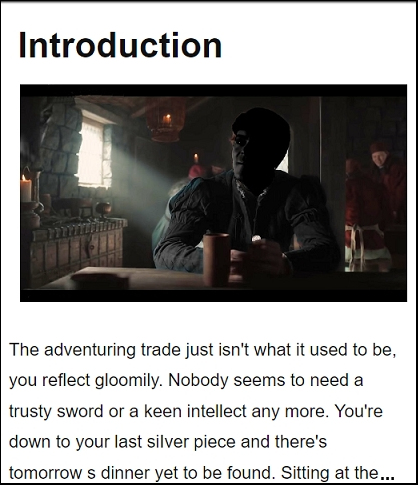Adding headers & footers to your book
MS Word makes it very easy to add headers and footers to a document but obviously you'll need to know what to add.
- For fiction it's not normal to add headers and footers to the front matter.
- For non-fiction you can add page numbers to the footers but in 'i, ii, iii, iv...' format
- Page numbers should be added to your book content in standard numerical format i.e. 1, 2, 3, 4...
- The author name usually appears on left-hand (even numbered) pages of the content and back matter.
- The book title usually appears on right-hand (odd numbered) pages of the content and back matter.
Here's an example of how I set these out:

As you can see page numbers are centered in the bottom footer, my name is centered in the left-hand page header, and the book title is centered in the header of right-hand pages.
If your computer shows only a single page spread instead of the two page one above then at the bottom right of the Word window click the percentage shown and follow the numbered steps shown here.

I suggest you start by formatting your manuscript as a paper book. Later we'll convert this to an ebook as well.
If you find this guide useful...
Can you help me out?
If you find these pages useful you can return the favour by downloading a FREE ebook from Amazon - even if you don't read it, it will help our rankings! I think you'll probably like it though.
Raging Storm is the first book of the Blood of the Rainbow trilogy written by my wife Shelia Chapman. It's a paranormal romance and can be regarded as a prequel to the A Vested Interest series. This first book is FREE. It's an unusual book in that the first people to read it all gave it five star reviews. By the time it had eleven of them people were starting to think the reviews were not real. I had to ask people to be more critical and NOT rate it five stars! Probably the reason it was so successful with reviews is that it has a very emotional and powerful ending.
The first ebook in the trilogy is FREE and available at multiple retailers.
So how do you do this?
You should already have set the position of the headers and footers in the book layout page. Let's start by adding a header. In the majority of books published today you'll find that the author's name appears on even page numbers - the left hand page of a two-page spread. The book title appears on odd pages - the right hand pages. In many books the header is written in BLOCK CAPITALS but remember what I said about such words losing their shape and being harder to read.
You don't need to regard these as rules however. I have seem many books with author name on the right, others with no author name but book title on the left and chapter title on the right. I have seen books with no headers at all and others with page numbers at the top. In my example below I put my author name at the top left and since the example is a collection of short stories, I put the book title and short story title on the right.
Here's the book without the headers and footers:

If you look carefully (if needed click the image to open it full screen. Return to this page using your browser back button) You'll notice I have Show/Hide turned on and my pointer is in the header area. To the left of it you'll see a greyed out pillcrow symbol (¶).
Double click the area in your story where my pointer shows. This will allow you to edit the header area.

You should now see that you are in a different toolbar - the Header & Footer toolbar. You can now edit the area as you would normal text but first make sure that you have turned off the 'Link to Previous' button and that 'Different odd & even pages' and 'Show document text' are both checked.
As in my example Chapter 1 should start on a right-hand, odd page because the last entry on the previous page was a 'Section Break (Odd Page)'
In the example the previous page was an epigraph.The Header
You can now select the 'Home' tab and start entering text in the header area. Since 'Chapter 1 is always a right hand page, above it in the header area you would normally simply enter the book title and center it as normal. In my example the book I'm working on is a collection of short stories so I'm going to be a little more 'fancy'.
At the left of the header I'm going to put the book title 'It Was a Dark and Stormy Night', I then press the tab key and enter the short story title 'Ripping Time'. Finally I click the 'Justify' icon (circled) of the Home toolbar to fully justify the header.

I'll do the same at the start of each short story so I'll get:
| It Was a Dark and Stormy Night | Ripping Time |
| It Was a Dark and Stormy Night | Witch Time |
| It Was a Dark and Stormy Night | Titanic Time |
| It Was a Dark and Stormy Night | Time Flies |
Scroll the MS Word document to the next page where you will see something like this:
Currently the left hand page header should be blank. Click the 'Center' icon on the toolbar and enter the Author name getting something like this:
 If you scroll on to the next two page spread you'll find the header shows your author name on left pages and the book title on right hand pages.
If you scroll on to the next two page spread you'll find the header shows your author name on left pages and the book title on right hand pages.
Or maybe a free online interactive adventure story?
Back in 1982 early text only adventure games were being written for home computers. One such game was 'Castle of Riddles' written by Peter Killworth and published by Acornsoft. Now it's been re-written and greatly expanded with added images and sound. Play it on your computer, tablet or even a phone.
Check it out at https://jaydax.co.uk/corr


Maybe this would be a good idea?
Dog seat belt
The footer
At the bottom of the pages we will enter page numbers again starting on the Chapter 1 page which will be page 1. MS Word makes it easy to do this using the 'Header & Footer' tab.

As you can see there are lots of options for placing page numbers. You can place them in a header, a footer,at the left, centre or right and create fancy page numbers if you wish. I prefer to keep things simple by placing the page number in the footer and centering it. That produces:

 "Hold on a second; didn't I hear you say start the number as '1'" I hear you say. You're right. Word has started counting the page numbers from the very beginning of the book and in my example that works out as page seven. However if you look at the image showing page number options you'll see an entry, 'Format number' Select it and select the button 'Start at:' You can then make sure the page numbering starts at '1'.
"Hold on a second; didn't I hear you say start the number as '1'" I hear you say. You're right. Word has started counting the page numbers from the very beginning of the book and in my example that works out as page seven. However if you look at the image showing page number options you'll see an entry, 'Format number' Select it and select the button 'Start at:' You can then make sure the page numbering starts at '1'.
The same Page Number Format window allows you to select different page number styles; something useful if you are writing non-fiction and have a much more complex set of front matter. By convention these pages would be numbered from the 'Contents' page starting i, ii, iii, iv, v... lower case Roman numerals.
So now you should have something similar to this. It's not quite right yet:

Deleting the extra paragraph return that Word has introduced will fix things. If you then scroll through the document you'll find the page numbers continue.

To leave the header and footer section close it with the X on the header and footer toolbar or double click the main text area.
Next: Produce a master copy of your paper book in docx format.
Want those short stories ?
The examples here are taken from a collection of short time-travel stories. They're great for taking a break from writing.
Check them out at http://iwadasn.info

Buy them (77p or $0.99) from your favourite retailer via https://books2read.com/tat.
As an Amazon Associate, I earn from qualifying purchases.

